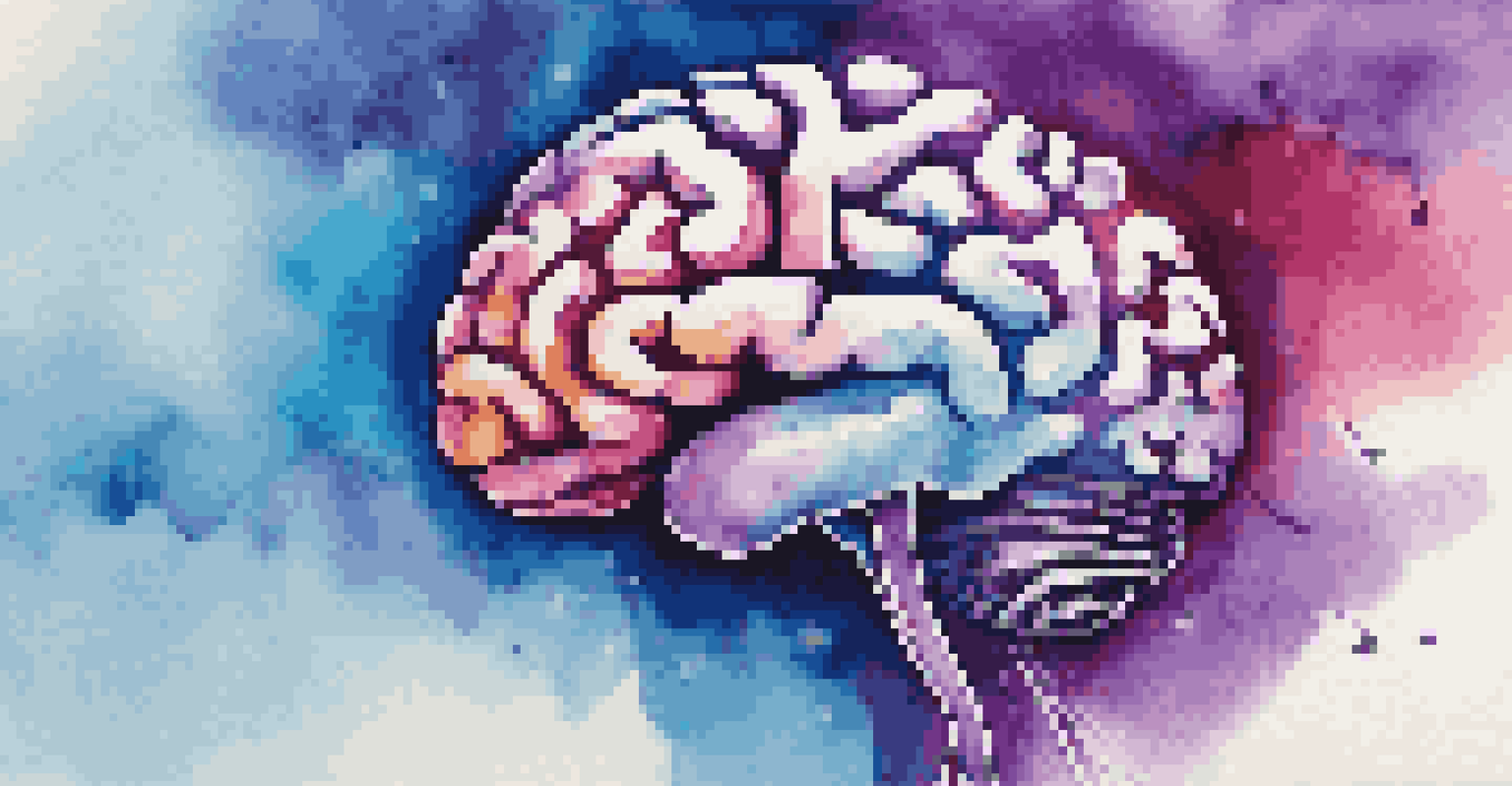How Music Modulates Stress Hormones and Brain Activity

The Connection Between Music and Stress Hormones
Music has a profound effect on our emotions, and this influence extends to our body's stress hormones. When we listen to calming music, our body often responds by reducing levels of cortisol, the primary stress hormone. Imagine coming home after a long day and putting on your favorite playlist; you might feel your tension melting away, and that’s partly due to this hormonal shift.
Music can change the world because it can change people.
Research shows that listening to relaxing music can lower blood pressure and heart rate, creating a sense of tranquility. For instance, studies indicate that participants who listened to soothing tunes experienced significantly lower cortisol levels compared to those in silence. It's like pressing a reset button on your stress levels, offering a natural way to unwind.
In contrast, fast-paced or loud music can sometimes increase anxiety and stress. Think about the difference between a quiet evening with soft melodies and a bustling concert. This variance highlights how the type of music we choose can either soothe our minds or amplify our stress responses.
How Music Alters Brain Activity
Music doesn't just affect our hormones; it also plays a crucial role in how our brains function. When we listen to music, various areas of the brain light up, including those responsible for emotion, memory, and even movement. This activation illustrates how music can engage our minds and evoke powerful emotional responses.

For example, the amygdala, which processes emotions, becomes more active when we listen to music that resonates with us. This explains why a certain song can remind you of a special moment or evoke feelings of nostalgia. It’s like our brains are wired to connect deeply with melodies and rhythms, making music a universal language.
Music Reduces Stress Hormones
Listening to calming music can lower cortisol levels, promoting relaxation and reducing anxiety.
Moreover, studies using brain imaging technology have shown that music can enhance cognitive performance and creativity. Think of musicians who often report feeling more inspired when they are surrounded by sound. This connection suggests that music not only stimulates our emotions but also boosts our brain's capacity to think and create.
The Therapeutic Benefits of Music
Music therapy is a growing field that harnesses the power of music to improve mental health. Therapists use music as a tool to help patients cope with stress, anxiety, and depression. For instance, in a therapeutic setting, clients might listen to or create music to express their feelings, which can be incredibly cathartic.
Where words fail, music speaks.
Evidence shows that music therapy can reduce symptoms of various mental health disorders. One study found that patients with anxiety who participated in music therapy experienced significant reductions in their symptoms. It’s a testament to how simply engaging with music can be a form of healing.
Additionally, singing or playing an instrument can provide a sense of accomplishment and joy, further enhancing mental well-being. Picture a group of friends jamming together; the laughter and camaraderie can create a supportive environment that uplifts everyone's spirits. This communal aspect of music adds another layer to its therapeutic benefits.
The Role of Music in Stress Management
Incorporating music into your daily routine can be a powerful strategy for managing stress. Whether it’s playing a calming playlist during work or winding down with soothing melodies before bed, music can help create a more relaxed environment. It’s like having a personal stress-relief tool at your fingertips.
Many people find that specific genres of music, such as classical or ambient, are particularly effective for relaxation. For example, a study revealed that participants who listened to classical music reported lower stress levels and improved mood. So, next time you're feeling overwhelmed, consider curating a playlist that helps you find your calm.
Music Enhances Brain Activity
Engaging with music activates brain regions involved in emotion and memory, boosting creativity and cognitive performance.
Moreover, music can serve as a distraction from stressors in our lives. Engaging with catchy tunes or thought-provoking lyrics can shift our focus away from worries, providing a mental break. Just as a good book can transport you to another world, a great song can pull you away from your troubles.
Personal Experiences with Music and Stress
Many individuals have personal stories about how music has helped them cope with stress. For instance, someone might share how a particular song helped them through a tough breakup or a challenging time at work. These anecdotes highlight the personal connection we have with music and its ability to provide solace.
Listening to music during difficult moments can create a sense of companionship, as if the artist understands what you’re going through. It's not uncommon to feel a wave of relief when you hear lyrics that resonate with your own experiences. This shared emotional journey can make us feel less alone in our struggles.
Additionally, some people find that playing music, whether it's an instrument or singing, serves as an effective outlet for their emotions. Just like venting to a friend, expressing feelings through music can be therapeutic. It’s a reminder that we all have our unique ways of navigating the ups and downs of life.
Creating Your Own Stress-Relief Playlist
Curating a stress-relief playlist can be an enjoyable and beneficial project. Start by selecting songs that make you feel calm and happy. You might choose tracks that evoke fond memories or ones that have soothing melodies. Think of this playlist as your personal sanctuary, a go-to resource for stressful moments.
Consider including a mix of genres to keep things interesting. Classical pieces, nature sounds, or even your favorite soft rock can create a diverse listening experience. It’s all about finding what resonates with you and what helps you unwind, like adding different colors to a painting to create a masterpiece.
Music Therapy Benefits Mental Health
Music therapy effectively helps individuals cope with stress, anxiety, and depression through active engagement with music.
Don't forget to update your playlist regularly to keep it fresh and aligned with your current mood. As you discover new music, you can replace older tracks that no longer serve you. This keeps your playlist dynamic and ensures it remains an effective tool for stress management.
The Future of Music and Mental Health Research
As research on music and its effects on mental health continues to grow, we can expect to see more innovative therapies and practices. Scientists are exploring how different musical elements, like tempo and harmony, can impact our emotions and stress levels. This could lead to tailored music therapy approaches designed to meet individual needs.
Additionally, technology is playing a significant role in this exploration. With the rise of apps that use music for relaxation and mindfulness, individuals have more resources than ever at their fingertips. Imagine having a personalized soundtrack that adjusts based on your mood, offering support whenever you need it.

The future of music in mental health is bright, with potential for even greater integration into therapeutic practices. As we continue to understand the intricate relationship between music and our brains, we may find even more effective ways to harness its power for stress management and emotional well-being.